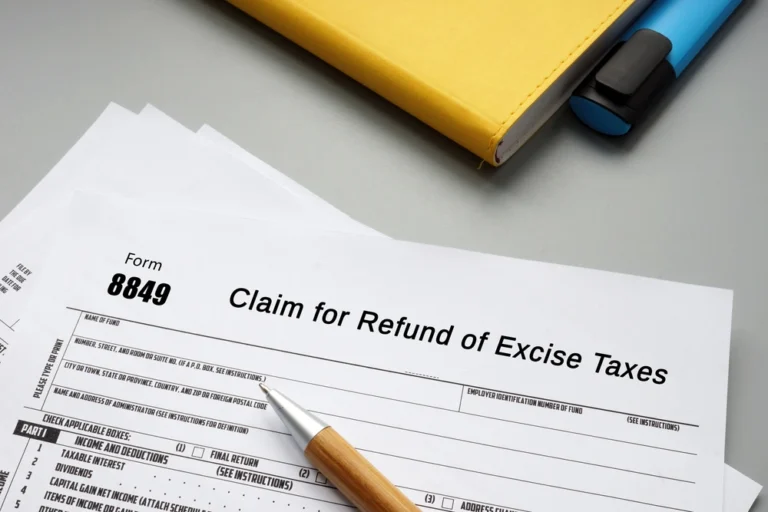For trucking professionals, understanding the Heavy Vehicle Use Tax (HVUT) is essential for maintaining compliance and managing operational finances efficiently. HVUT funds are critical for maintaining U.S. highways, ensuring safer and smoother transportation routes. However, circumstances like vehicle sales, destruction, or reduced mileage can result in HVUT overpayments—funds that truckers are entitled to recover.
This is where IRS Form 8849 comes into play. Designed to handle excise tax refunds, Form 8849 helps truckers reclaim overpaid HVUT quickly and efficiently. This guide will walk you through everything you need to know to manage overpayments effectively.
When Does HVUT Overpayment Occur?
Overpayments of the Heavy Vehicle Use Tax (HVUT) are more common than many trucking professionals realize. Situations such as changes in vehicle status, reporting errors, or miscalculations can lead to paying more than what is actually owed. It’s essential to identify these overpayments early and address them promptly to reclaim funds efficiently. Here are the most common scenarios that result in HVUT overpayment:
1. Vehicle Sale or Destruction
If a vehicle is sold, destroyed, or retired during the tax year, the HVUT liability decreases because the tax applies only to the months the vehicle was in operation. In such cases, truckers can file for a prorated refund covering the unused portion of the tax period.
- What Happens:
- If a heavy vehicle is sold to another owner, taken off the road permanently, or destroyed due to an accident or mechanical failure, the annual HVUT no longer applies for the months the vehicle is not in use.
- Prorated refunds allow truckers to reclaim taxes paid for these unused months.
- Example:
- If a trucker pays the annual HVUT but sells the vehicle six months into the tax period, they are eligible to claim a refund for the remaining six months. For instance, if the full annual HVUT liability was $550, they could recover approximately $275, reflecting the unused portion.
- Common Situations:
- Fleet Downsizing: Operators reducing the size of their fleets by selling or retiring older vehicles mid-tax year.
- Accidents or Irreparable Damage: Vehicles destroyed or totaled, rendering them unusable.
- Upgrades or Replacements: Selling older trucks to replace them with newer vehicles.
Proper documentation, such as bills of sale, accident reports, or destruction certificates, is crucial to substantiate the claim for a prorated refund.
2. Reduced Mileage Use
HVUT applies only to vehicles driven over 5,000 miles (or 7,500 miles for agricultural vehicles) during the tax year. Vehicles that do not exceed these mileage thresholds are considered exempt. If HVUT was paid initially based on expected usage but later determined to be below the threshold, truckers can file for a refund of the overpaid taxes.
- What Happens:
- Truckers may initially pay HVUT, anticipating regular usage. However, if the vehicle is driven fewer than 5,000 miles, it qualifies as a “suspended vehicle,” exempt from HVUT for that tax year.
- Examples of Reduced Mileage Scenarios:
- Seasonal Use: Agricultural trucks or other vehicles used only during specific seasons.
- Downtime: Extended repairs, maintenance, or unexpected downtime reducing vehicle mileage for the year.
- Temporary Fleet Changes: Trucks taken off routes due to shifts in workload or driver availability.
- Importance of Accurate Mileage Records:
Maintaining detailed mileage logs is critical for claiming this refund. Mileage should be accurately tracked using odometer readings or Electronic Logging Devices (ELDs) and submitted as proof of reduced usage.
3. Filing Errors
Mistakes made during the initial HVUT filing process can easily result in overpayment. These errors can include:
- Incorrect Vehicle Identification Numbers (VINs):
- A simple typo in the VIN can cause duplicate filings, leading to double tax payments.
- Overreported Vehicle Weight:
- HVUT rates are determined by a vehicle’s taxable gross weight. Misclassifying a truck into a higher weight category can result in paying more than what’s owed.
- Example: A vehicle with a taxable weight of 56,000 pounds being incorrectly reported as 80,000 pounds would lead to a significant overpayment.
- Duplicate Filings:
- Filing and paying HVUT multiple times for the same vehicle due to oversight or administrative errors.
- Solution for Filing Errors:
- Filing corrections promptly allows truckers to reclaim overpaid amounts. Keeping copies of the original filing and proof of payment helps expedite the correction process.
4. Mid-Tax Year Vehicle Status Changes
Changes to a vehicle’s operational status mid-tax year can also lead to overpayments. For example:
- Temporary Retirement: A vehicle may be pulled from operations for part of the tax year due to planned downtime or reassignment.
- Ownership Transfers: When vehicles are transferred to another operator or fleet during the tax year, the new owner assumes HVUT liability for the remaining months. If the original owner paid for the full year, they are entitled to a prorated refund.
In each of these cases, truckers should monitor their fleet closely, keeping track of changes to vehicle status and documenting the dates when a vehicle is no longer in use.
Proactively identifying HVUT overpayments allows trucking businesses to recover funds quickly and avoid cash flow disruptions. Whether due to vehicle changes, reduced mileage, or filing errors, staying organized with documentation and tracking vehicle usage ensures you can reclaim your hard-earned money without unnecessary delays.

Key Benefits of Filing Form 8849
Filing Form 8849 to claim refunds for overpaid Heavy Vehicle Use Tax (HVUT) is not just about recovering funds—it’s a proactive approach to improving financial stability, optimizing cash flow, and ensuring regulatory compliance. Here are the key benefits that make timely filing essential for trucking businesses and owner-operators:
1. Recover Funds Tied Up in Overpayments
HVUT overpayments can tie up critical operating funds, leaving businesses with less money to address day-to-day expenses or long-term investments. By reclaiming these funds through Form 8849, operators can:
- Reinvest in Vehicle Maintenance:
Regular maintenance is vital to keeping trucks running efficiently and preventing costly breakdowns. Refunds can be allocated to essential repairs, oil changes, tire replacements, or engine work that ensures vehicles remain in top condition. - Cover Fuel Costs:
In the trucking industry, fuel is one of the largest operating expenses. Reclaiming overpaid HVUT provides additional cash flow that can help offset rising fuel costs and keep trucks on the road without interruption. - Expand or Upgrade Your Fleet:
For fleet managers looking to grow or modernize operations, recovered funds can be reinvested into purchasing newer, more fuel-efficient trucks or upgrading older vehicles. - Improve Profit Margins:
Freeing up funds that would otherwise be tied up in overpayments allows businesses to focus on boosting profitability, managing unexpected expenses, and maintaining financial stability.
Overpayments, when left unclaimed, represent missed opportunities to reinvest in operations and support long-term business growth. Filing Form 8849 ensures these funds are put to better use.
2. Maintain Financial Flexibility
Maintaining financial flexibility is critical for owner-operators and fleet managers, especially in an industry where cash flow can be unpredictable due to fluctuating fuel prices, repair costs, and market demands. Filing Form 8849 promptly for HVUT refunds helps businesses:
- Avoid Cash Flow Disruptions:
Overpaid taxes can create unnecessary strain on cash reserves, which are often needed to cover payroll, fuel, insurance, and other operational costs. Reclaiming these funds reduces the risk of shortfalls and allows for smoother day-to-day financial management. - Prepare for Unexpected Expenses:
Trucks frequently encounter unforeseen issues such as breakdowns, mechanical repairs, or compliance-related upgrades. Having access to reclaimed funds provides a financial cushion to address these emergencies without derailing operations. - Ensure Liquidity During Downtime:
Seasonal slowdowns, economic shifts, or vehicle downtime can affect earnings. Recovered HVUT refunds can help bridge financial gaps during these periods, ensuring that businesses remain stable and operational.
In a high-cost industry like trucking, financial flexibility enables businesses to stay agile, adapt to challenges, and make strategic decisions without being constrained by cash flow limitations.
3. Ensure IRS Compliance
Compliance with IRS regulations is a non-negotiable aspect of running a trucking operation. Filing Form 8849 promptly and accurately ensures that businesses remain compliant while avoiding unnecessary complications and penalties. Key compliance benefits include:
- Avoiding Filing Errors:
Submitting refunds through Form 8849 allows truckers to correct any errors made during the initial HVUT filing, such as duplicate payments, VIN mistakes, or weight misclassifications. Prompt corrections help prevent discrepancies that could draw IRS scrutiny. - Meeting Filing Deadlines:
Refund claims for overpaid HVUT must be filed within specific IRS deadlines:- Three years from the date of tax payment.
- Two years from the date the original return was filed.
Filing on time ensures that businesses reclaim eligible funds and remain compliant with IRS guidelines.
- Avoiding Penalties and Audits:
Accurate and timely filings demonstrate compliance and reduce the likelihood of penalties or audits that could arise from inconsistencies in tax reporting. Proper record-keeping and refund claims ensure businesses maintain a clean tax history. - Staying Organized for Future Filings:
Filing refunds promptly encourages better organization of tax documents, vehicle usage records, and payment history. This proactive approach not only streamlines future filings but also positions businesses to respond quickly to IRS inquiries or audits.
Maintaining compliance is essential for protecting a trucking business’s reputation and avoiding costly disruptions caused by non-compliance. Filing Form 8849 ensures all bases are covered while reclaiming overpaid taxes.
How to File Form 8849 for HVUT Refunds
Filing Form 8849 correctly ensures your refund claim is processed smoothly. Follow these steps to reclaim your overpaid HVUT:
- Gather Required Documentation:
- Employer Identification Number (EIN): Verify it matches IRS records.
- Vehicle Identification Numbers (VINs): Ensure all VINs are correct and consistent.
- Proof of Overpayment: Provide bills of sale, destruction reports, or detailed mileage logs where applicable.
- Complete Form 8849 Schedule 6:
- Schedule 6 is specifically used for claiming HVUT refunds.
- Accurately calculate your refund amount, ensuring it aligns with IRS formulas.
- Clearly state the reason for the refund (e.g., vehicle sold, destroyed, or under mileage threshold).
- File Form 8849:
- Ensure the form is complete, accurate, and submitted on time to avoid delays.
- Claims must typically be submitted within three years of the tax payment date or two years from the date the original tax return was filed.
- Track Your Refund:
- Keep copies of all documentation and monitor the refund status to ensure the IRS processes it without issues.
Take the Next Step
Filing for HVUT refunds doesn’t have to be complicated. Whether you’re correcting an error, reporting vehicle changes, or reclaiming overpaid taxes, getting it right saves time and money.
For a faster, more accurate Form 8849 filing process, explore how ExpressTruckTax can simplify and streamline your tax refund claims. Reclaim overpaid HVUT efficiently and focus on what matters most—keeping your business on the road.

